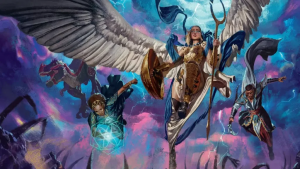Magic: The Gathering (MTG proxy) is not just a card game; it’s a cultural phenomenon that has captivated millions of players worldwide since its inception in 1993.
Created by Richard Garfield and published by Wizards of the Coast, MTG pioneered the collectible card game genre, leading to a diverse and vibrant ecosystem of players, collectors, and enthusiasts.
Among the myriad facets of MTG culture, the practice of using MTG proxies holds a unique place, blending the lines between accessibility, competition, and creativity.
The Dawn of Magic: The Gathering
MTG Proxy began as a simple idea: a game that combined the strategy of traditional card games with the fantasy of role-playing games, allowing for a dynamic experience that was both competitive and collectible.
Its success was immediate, sparking a global phenomenon that has grown exponentially over the decades. With each new set release, players are invited into expansive worlds filled with intricate lore, compelling characters, and, of course, powerful spells.
The Evolution of the Game and Its Community
As the game evolved, so did its community. Tournaments became larger, and the secondary market for MTG cards exploded. Certain cards became highly sought after, not just for their in-game utility but as collectible investments.
This surge in demand led to significant price increases for rare cards, making them less accessible to the average player.
Enter the World of MTG Proxies
MTG proxy refers to a card used in place of another card that a player might not own or wish to use in casual play. Proxies can range from simple handwritten notes on slips of paper to high-quality prints that closely resemble the original cards.
The use of proxies is a topic of much debate within the MTG community. However, their prevalence underscores a fundamental aspect of the game: the desire to play and enjoy MTG in a way that is accessible and inclusive.
Why Use Proxies?
- Accessibility: Proxies make the game more accessible to those who cannot afford or find rare and expensive cards.
- Testing: Players often use proxies to test new decks before committing to purchasing the actual cards.
- Casual Play: In casual settings, proxies allow players to experience the game without the constraints of their collections.
The Official Stance and Community Ethics
Wizards of the Coast, the publisher of MTG, prohibits the use of proxies in official tournaments. However, they acknowledge the community’s use of proxies in casual play to ensure that the game remains inclusive and enjoyable for all.
The MTG community, for its part, generally supports the use of proxies in informal settings, emphasizing the importance of consent and transparency among players.
FAQs
How did Magic: The Gathering start?
Magic: The Gathering (MTG Proxy) started as the brainchild of Richard Garfield, a doctoral candidate in combinatorial mathematics. It was introduced in 1993 by Wizards of the Coast, marking the beginning of the collectible card game genre.
Who started Magic: The Gathering?
Richard Garfield, with the support of Wizards of the Coast, started Magic: The Gathering. Garfield was a mathematician and game designer who aimed to create a game that was both strategic and collectible.
Is there a storyline to MTG Proxy?
Yes, Magic: The Gathering features a rich and complex storyline, woven through its card releases. The narrative spans multiple planes of the Multiverse, involving various characters, factions, and conflicts. Each set and block of cards typically explores new aspects of the MTG Proxyuniverse and its lore.
Conclusion: The Magic of MTG Proxy
The history of Magic: The Gathering is a testament to the game’s enduring appeal and the community’s passion for creativity and strategic depth.
Proxies embody the spirit of inclusivity and innovation that has always been at the heart of the MTG community. Whether used for accessibility, testing, or casual fun, proxies ensure that the magic of the game is available to everyone, regardless of their collection’s size or value.
For more Details Visit Printingproxies




